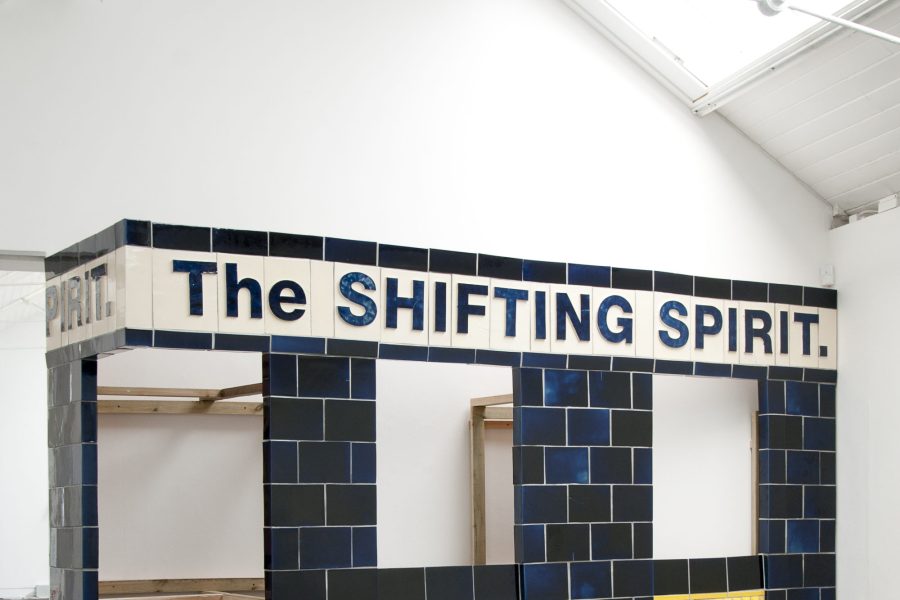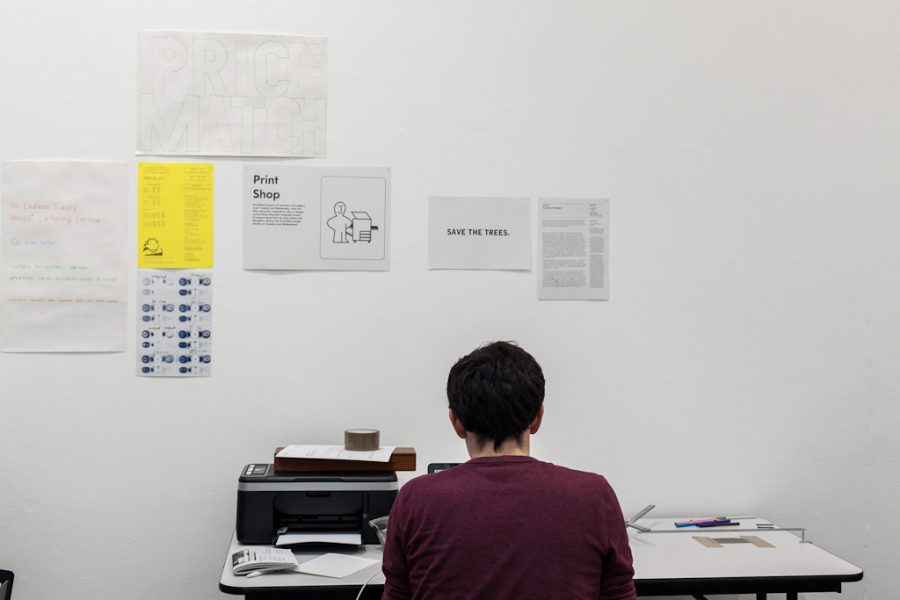Revital Cohen and Tuur Van Balen’s work sits between art and design; advanced technology and engineering. Their ongoing investigation into materials, and the political systems in which they exist, result in works that question use, value, and our increasingly symbiotic interdependence with the world of technology. In their studio, we discussed their new commission for Jerwood Visual Arts, Giving More to Gain More (2014), a series of LED sculptures that emit words and phrases taken from email conversations with the manufacturers of the lights, based in China. The result is a manufacturing ‘pidgin’ language; odd, a little eerie, crossing cultural and geographical divides, but linked by a strange specificity.
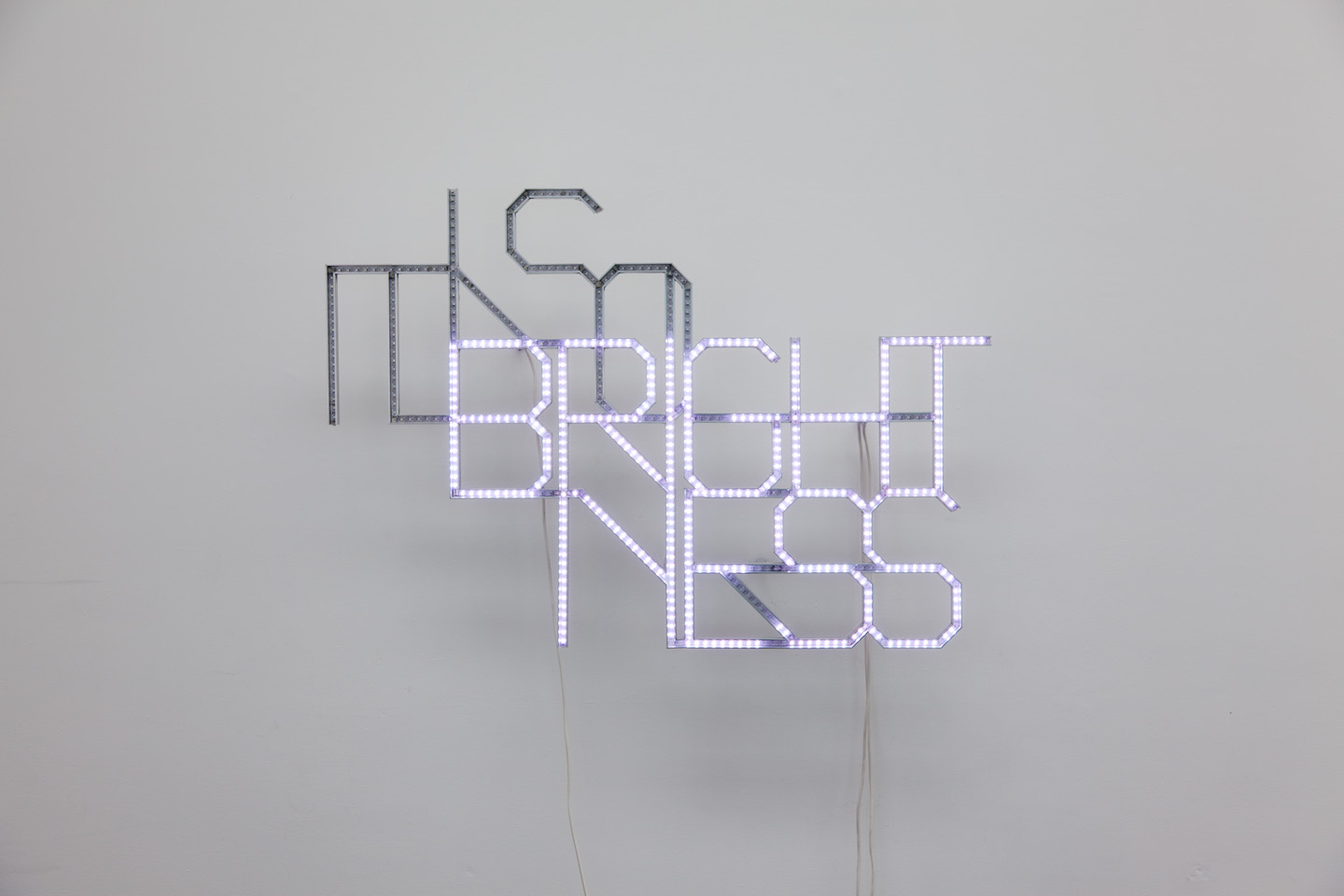
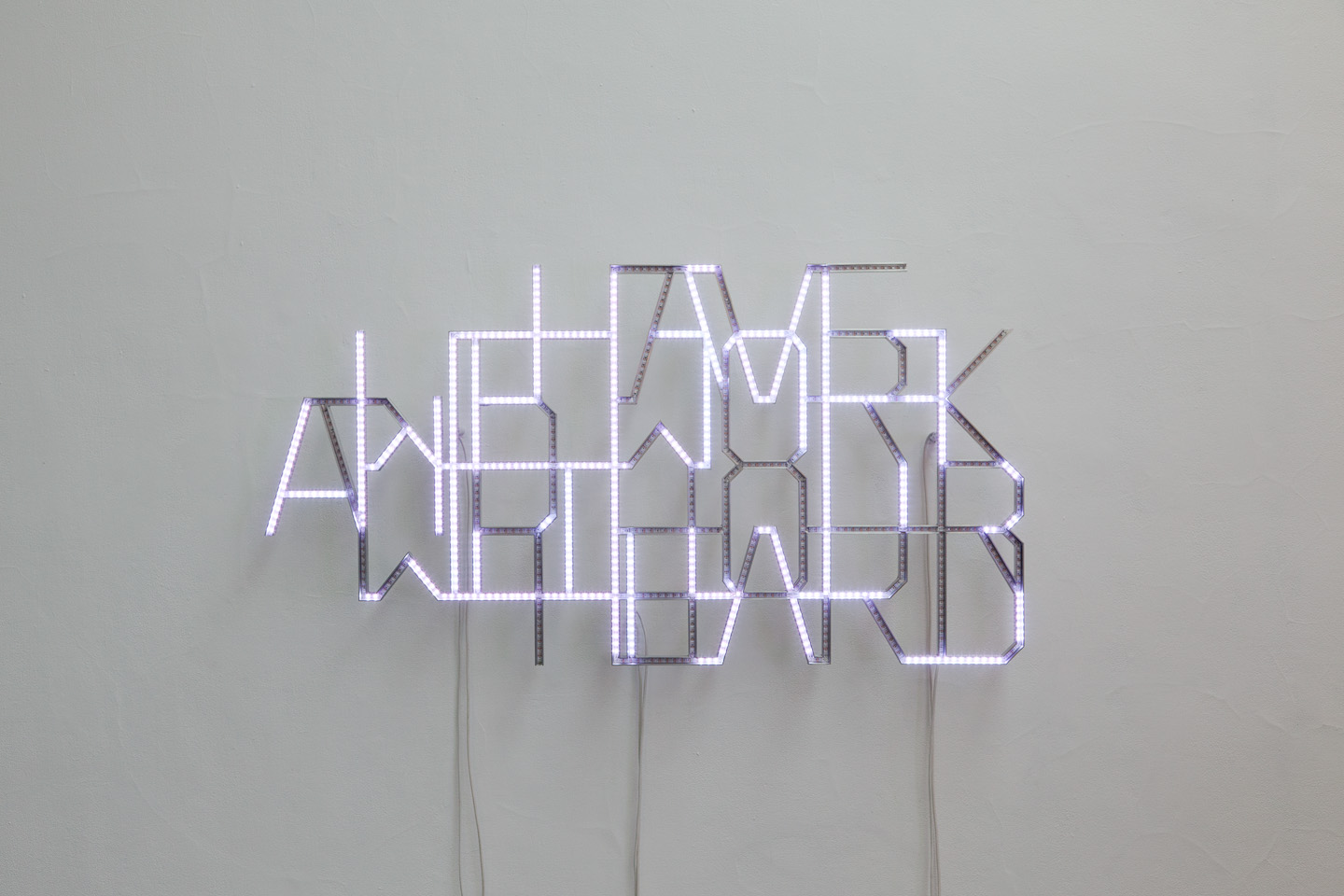
Basia: This piece seems quite different to your previous works.
Revital: For us it’s always a natural progression from the other works – I’m interested to hear why you think it’s different?
Basia: Perhaps because of the focus on language and text, and the vernacular of manufacturing, rather than the process itself. What seems to be thematic in your work is the transportation of objects or materials out of their ‘usual’ habitats, and representing them way that alters our understanding of their use, or presence in our lives. This focus on language is more ambiguous in terms of use and value.
Revital: This language came out of a previous work, called 75 Watt (2013), and another, a wolf in a forest – Nowhere a Shadow (2013). We ordered all these LED lights for those projects, but there was something peculiar about the language of manufacturing, which we increasingly found fascinating.
Tuur: Our main focus is on materials and production. And that’s very broad. We made a piece with a pigeon – Pigeon D’or (2011) [a bacteria that makes pigeons defecate soap] – which was very much about biology as a material, but also the cultural, political and ethical consequences of using biology as such, in the context of mass manufacturing, but also in terms of synthetic biology.
In this instance, it was the language of production that intrigued us, and when we as artists think about these processes, we don’t think of them as purely technical. We consider them as cultural and political processes too. In 75 Watt, we were intrigued by the product being made, but as much by the bodies on the assembly line, too. It goes back to Frederick Winslow Taylor and the efficient movement, and time-motion studies by the Gilbreths.
At the time, we were doing a lot of work in China, and often via platforms like Alibaba.com, which are very much contemporary platforms for global mass manufacture. It struck us that this language that emerges is a pidgin language. We saw this piece as a way of reflecting on the ideas of what ‘making’ might still mean as an artist where outsourcing has become a process of making art.

Revital: It’s a reality of our work, because we use so many technological materials – they all come from China. I mean, you can get anything there. So many things are impossible to find here, but one email through Alibaba.com and 20 people want to talk to you about LEDs. There were also so many conversations around the materials themselves, which have such a specific nature. Descriptions of light, specifications, colours, letters and numbers and specs – super technical things. The only way to get these materials is to go through these conversations. That’s our manufacturing reality at this moment.
Basia: Is it related to a language (if you can call it that) like spam? A pragmatic language that occurs at the intersection between people and technology? Standing in front of your installation, the words and terms change according to where you position yourself, your body mediates the communicative element of the technology.
Tuur: It’s a nice analogy. It definitely has many parallels. These words do go through a natural process of filtering – the people optimise their way of talking to you, in trying to get you to buy something.
Revital: Although with spam you have the sense you are just 1 in a million of copy-and-pastes, whereas here it so quickly it becomes a personal conversation.
Tuur: Yes, spam in its algorithmic nature is not like this. All the words displayed in Jerwood Visual Arts are taken from conversations we’ve had with the manufacturers of the LED lights they are displayed in. These were from April, that was her name. Obviously these are just snippets of longer emails, which we were considering to display in the gallery, but we chose not to.
Basia: They feel abstract, in a way in a word game can be – there’s a playfulness to them. Where language is usually clear to those fluent in it, words immediately recognisable, here there are long periods of not-knowing, as the words shift and reassemble. Is this also significant in the context of the cross-cultural conversations being had, typical of many manufacturing exchanges between China and elsewhere?
Tuur: Another thing I was thinking of, when you mentioned technology and spam, is that it might well be that some of these conversations have been automatically translated, through Google or something else. A few years ago we made a work inspired by Turing, and how he defined artificial intelligence, and how central language is to our definition of humanness and human intelligence as opposed to a machinic knowledge. We made something like a music video, where we took lyrics from ‘Yesterday’ by The Beatles, and passed it multiple times through online translators, eventually back to English. In the end, we got this strange, new, poetic computer understanding of language.
Revital: With this work, we were really interested in Alibaba.com, and this marketplace. Before the website entered our lives, we always wanted to see materials. The ideal is to go to a shop, to see and touch, and think with the material in your hand. But if you want to work with more technological materials, then it’s just not possible. So, you have to put your trust in Alibaba.com. You are never quite sure if it’s reliable, but once it becomes a part of your life, it’s like an Aladdin’s cave of materials. Everything, everything.
Basia: So it’s a portal into an infinite market place, and I wonder about the ethical dimensions of this. What is the consequence of this unfettered, unlimited access to materials? And I think this relates to a wider question about the consequence of China’s position as exporter to the world.
Tuur: If you go to Guangzhou or Shenzhen, to these electronic markets, they’re so vast. Physically having been there, it helps to understand how it is possible that there are thousands of companies manufacturing every little thing, producing masses and masses of it.
Revital: It’s probably not going to last there. It’s already moving towards Vietnam and Cambodia, and the ethical implications of that are very interesting. I wouldn’t say we have a direct answer, but that’s why we are so fascinated in working there, and working in that context.
Tuur: I think in terms of the ethics, the first thing that we have to acknowledge is that however much we think that something is ethically complex, we will always be implicated within it. What we’re trying to do with the work is partly to explore this ethical dimension, but always to start with the acknowledgement that we’re part of the process. In the piece we’re presenting at Jerwood Visual Arts, there’s an interesting reversal. We did a crazy amount of hand-work on the pieces, welding them all together, and then soldering them. In some ways, it’s the opposite: the instructions came from China, and we did all the manual labour.
Revital: But we also put work into illuminating these sentences from a young Chinese girl working in a factory, we wanted to giver her presence. She’s not just an anonymous service provider.
Tuur: When it comes to these ethical questions, and especially biology as a material, in the context of industrial production, I think these ethical implications are very profound. For example, in 75 Watt we wanted to represent contemporary factories in China, in which actually labour conditions are very reasonable (although of course it’s very difficult for me to comment on that). But we didn’t want to find a sweatshop, where people sit on the floor. Although they exist. Because that would have made the work very different, and perhaps less interesting. It’s important to keep the ambiguity at an ethical level, because it’s there that we as artists keep on working and looking, walking that path.
Basia: Could you talk about how this work fits into the broader trajectory of your practice?
Revital: It feels like each project gives birth to the other (with many links). And they come together in a few different routes, which for us make perfect sense. With this commission, we wanted to pursue this language because of our earlier work with the translations of Yesterday. It’s been cooking for a while. But it is also relevant to the work we made where we assembled various technological objects and removed all the minerals from them, casting them back into a mineral form. It’s about taking apart an industrial, electronic product and exploding it, exploring the people who assemble it, the minerals that allow it to be, the places through which it comes.
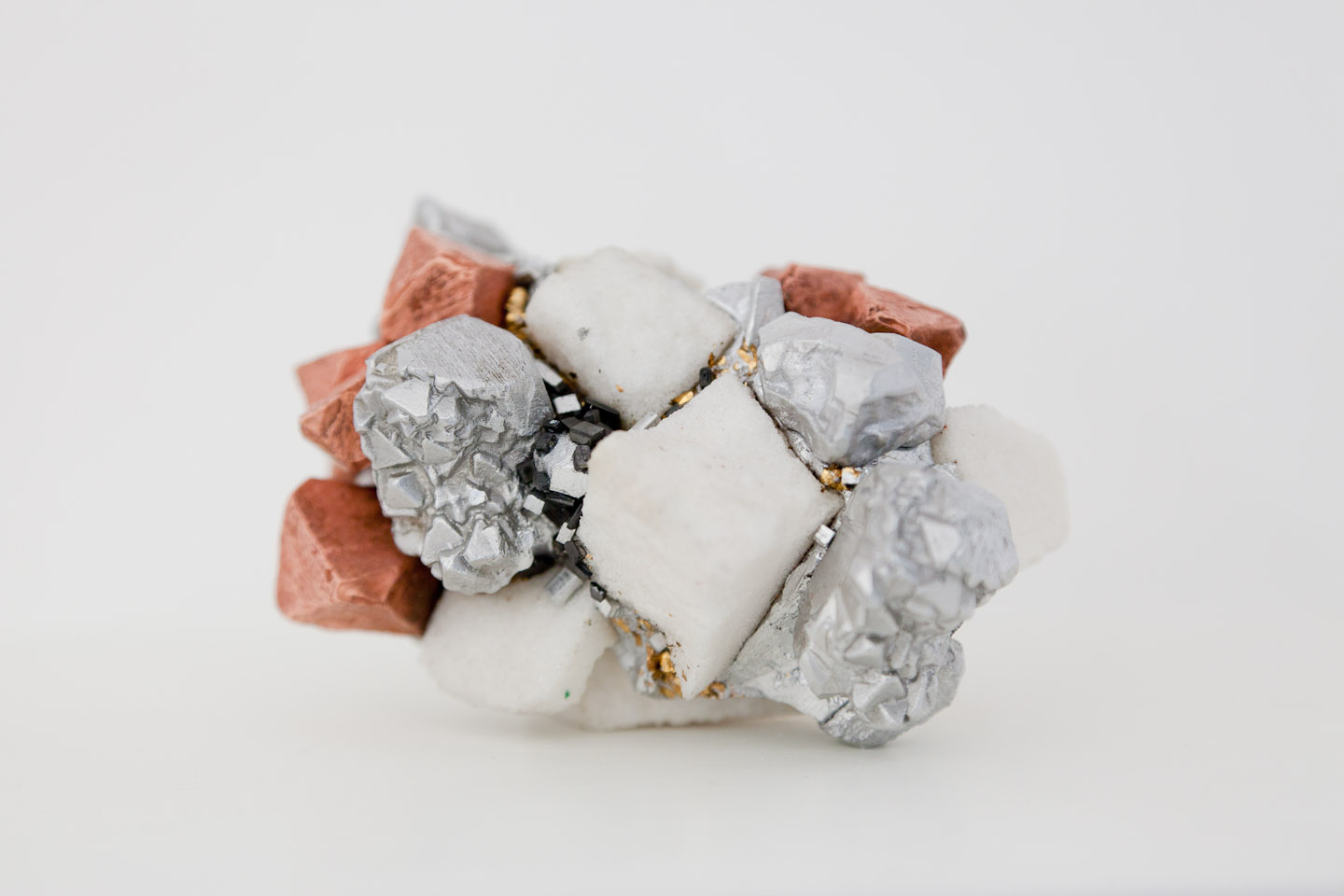
Tuur: It’s about seeing the systems that underly these modes of production as political. 75 Watt came out of a quote from a handbook of mechanical engineering, which says that an average labourer on an average day can produce 75 watts, average. What we liked about that was the tension between biology and technology, a tension between the biological body on the assembly line, that can not be quantified and characterised, and cannot be understood by the same logic of engineering which it’s really relying on, the quantification, characterisation, standardisation. It cannot fit within this larger system of production. The pigeons are similar – synthetic biology is a branch of technology and science, and the people we were working with had the same sort of ideals – to standardise and characterise biology to form part of a more reliable system. That, somewhere down the line, is a capitalist system. So, these political systems are underlying modes of production, with regards to biology and technology, whether at the scale of the human body or the assembly line, or bacterial production, or urban ecologies.
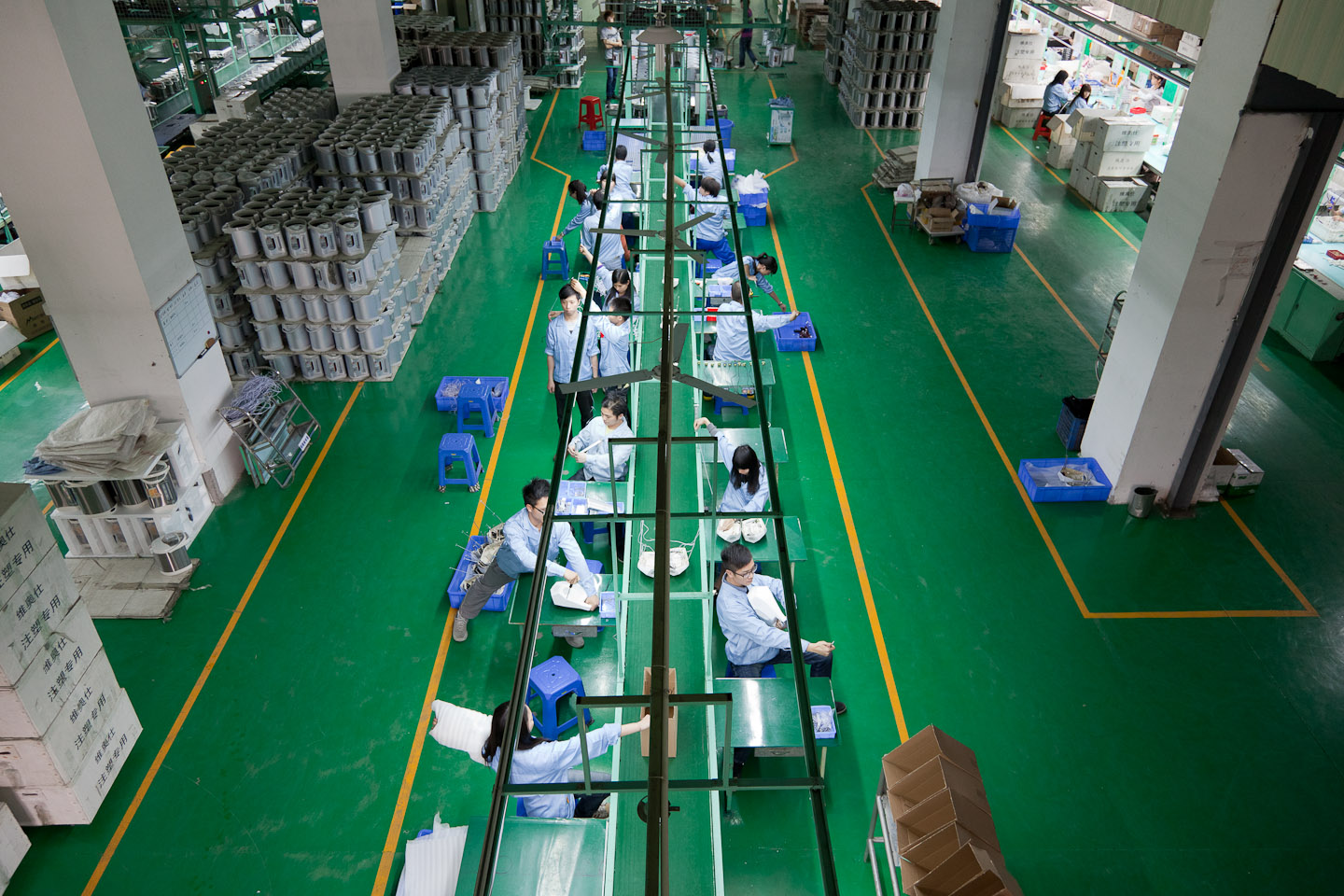
Revital: It’s about exploring the system of manufacturing when the engineering logic is removed. When there isn’t a clear use value or end point.
